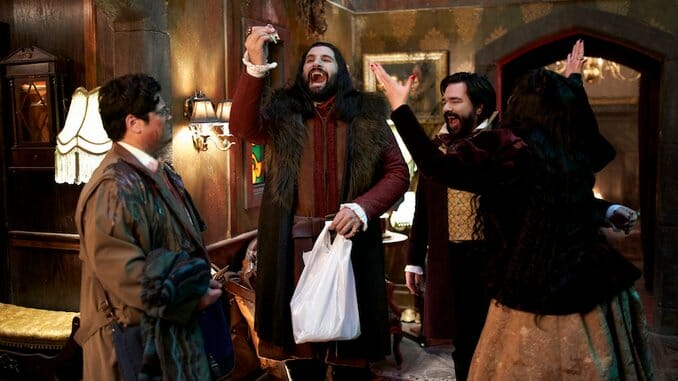In Praise of What We Do in the Shadows and the Dying Institution of Weird TV Comedies
Photo Courtesy of FX
There’s something courageous in the fact that FX’s What We Do in the Shadows, a vampire comedy in its second season, isn’t trying that hard to appeal to a broad audience. Yes, there has been a medium-strong publicity push behind it, and yes, obviously everyone involved wants to see it reach a huge audience, but the prevailing force behind this show is weirdness. Derived from the hilarious mockumentary of the same name made by Jemaine Clement and Taika Waititi in 2014, the show follows the same premise: The life and times of three vicious but dorky but vain but also inept vampires living together in the same rundown house in the suburbs. They dream of former glory, but their lives consist mostly of mundane indignities brought on by their stupidity, as when Nandor the Restless (Kayvan Novak) flies into a major panic as he tries to find email addresses so he can avoid the curse of a “send this to 10 people or you’ll die!” spam email.
The show is funny, and occasionally very funny, but I’m less interested in extolling its comedy virtues than I am in rejoicing at the fact that it exists. When Clement and Waititi made their original film, they had a certain freedom to create something strange and offbeat, and Clement had the cachet from the hugely popular Flight of the Conchords at his back. American TV is a different animal, though, and for FX to take a chance on a comedy like this sends a hopeful message about the range of what’s still possible on domestic airwaves.
There’s a concept in politics called the Overton Window, defined as the range of beliefs that the American public writ large will find acceptable at any given. The window shifts—universal healthcare is more viable now by far than it was ten years ago, for instance—but the discourse is limited by what fits into that window at a given time. This concept is easily translated to TV and the Internet, but if the American public is becoming more open-minded politically, the range of acceptable content on our most popular mediums seems to be dwindling. You may have noticed that in recent years, your favorite websites are all shutting down, sometimes because they can’t make money, and other times because a rich person in power who doesn’t understand their appeal decides they no longer need to exist (RIP Gawker, Deadspin, etc.). A similar phenomenon seems to be happening in TV, in the sense that it’s becoming harder, not easier, to create “weird” television … even if the potential audience for that kind of material should be growing by the year.
That’s particularly true in comedy, where the networks have become so standardized that even a show like Community feels impossible in our current era—and indeed, was engaged in a constant survival struggle even as it aired. Seeking alternatives in comedy, you’d immediately think of Comedy Central, which did indeed have a unique, wonderful show in Detroiters… which it canceled after two seasons. The current programming at that channel is mostly dire, and the shows that succeed tend to be standard fare. Where is the next Nathan For You? The next Review? The same is true on HBO. That network’s comedies are among the best on TV, but they aren’t taking enormous risks in style or format (with the arguable exception of Los Espookys), and haven’t since Conchords.
Adult Swim is where the truly strange comedies live, and much of their programming is brilliant, but they tend to be so fully off-the-wall that only the truly depraved and mentally corrupted comedy fans (yours truly included) can appreciate them. They don’t even pretend to want a larger audience. It’s fun, but—this might be unfair—it’s also a slight cop-out in how it cedes the lion’s share of comedic terrain to the great vanilla Other, and tacitly accepts the premise that truly funny comedy will only ever be esoteric.
-

-

-

-

-

-

-

-

-

-

-

-

-

-

-

-

-

-

-

-

-

-

-

-

-

-

-

-

-

-

-

-

-

-

-

-

-

-

-

-








































